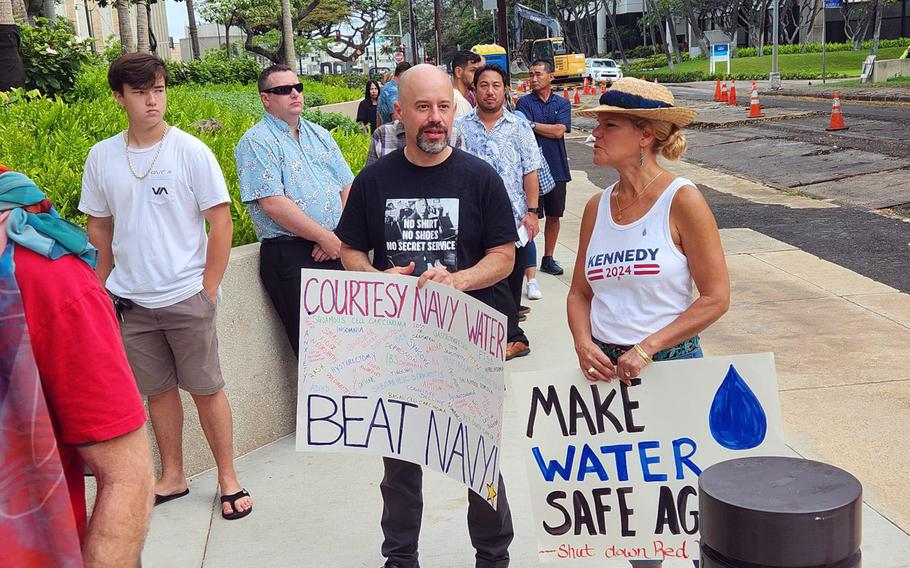
Supporters of plaintiffs suing the U.S. government over injuries they say they sustained from jet-fuel contamination in Hawaii wait outside the federal courthouse in Honolulu, April 29, 2024. (Wyatt Olson/Stars and Stripes)
HONOLULU — Jet fuel contamination of the Navy’s Pearl Harbor drinking water system in late 2021 was too minute and too short-lived to have caused long-lasting medical problems by those exposed to it, an attorney for the U.S. government said in Hawaii federal court Monday.
It was the opening day of trial in the civil suit brought by the first 17 plaintiffs claiming medical, emotional and financial injury from the contamination, which originated with a spill on Nov. 21, 2021, at the Red Hill Bulk Fuel Storage Facility a few miles from Joint Base Pearl Harbor-Hickam. U.S. District Court Judge Leslie Kobayashi is hearing the case without a jury.
Another roughly 7,500 plaintiffs have joined several other lawsuits also seeking compensation.
The outcome of this so-called bellwether trial will affect how litigation will proceed for the remaining plaintiffs.
The government has admitted responsibility for the jet fuel leak, but it disputes that the medical problems described by the plaintiffs came from exposure to the contaminated water.
“What remains at issue is causation and damages,” Rosemary Yogiaveetil, a U.S. Department of Justice attorney, said in the government’s opening statement.
“Under the law, science matters,” she said. “Plaintiffs cannot demonstrate a causal link between their injuries and spill of Nov. 21.”
Yogiaveetil said the government will introduce modeling to show that the contamination of one of the Navy’s three wells used for its system could not have spread throughout the entire distribution system in a manner significant enough to affect the health of residents.
Plaintiff Nastasia Freeman lived at Aliamanu Military Reservation with her active-duty Navy husband and two children at the time of the contamination.
According to a declaration filed in the case, Freeman and her family suffered from abdominal pain, vomiting, memory loss, skin rashes, brain fog, eye irritation, seizures and teeth and gum issues.
Yogiaveetil questioned whether those symptoms could be traced to the spill, noting that Freeman and her family sought medical care for some of those conditions in the months preceding the contamination.
During her opening statement, Kristina Baehr, the plaintiffs’ lead attorney, presented a montage of photos and video clips of her clients, some lying in hospital beds hooked up to IV drips and oxygen masks.
At one point she lifted a sealed jar of murky water that a plaintiff had saved during the initial weeks of the water crisis, but Kobayashi chided her for unneeded theatrics.
“I am not taking this into evidence, so move along,” Kobayashi said. “This is not a jury trial.”
Scores of plaintiffs and their supporters rallied outside the Honolulu courthouse Monday morning.
Some held picket signs, one reading, “My dad is now deaf from showering. Navy … Do you hear us now?”
“Thousands of people went to the emergency room on the island of Oahu in November and December 2021 because they drank water contaminated with jet fuel,” Baehr said while standing amid the throng before the courthouse opened. “The government calls it contaminated. Our clients and the people of Hawaii call it poisoned.”
Defense Secretary Lloyd Austin in March 2022 ordered the Red Hill facility permanently closed, a task that will not be completed for many years.
A Navy task force is cleaning out small pockets of fuel left in the pipelines and faces the lengthy task of removing about 28,000 gallons of sludge laying in the bottom of the facility’s 20 massive tanks.
A 2022 Navy investigation into the cause of the November 2021 spill found contributing factors included “a culture of procedural non-compliance; material deficiencies; poor training and supervision; ineffective command and control; absence of ownership regarding operational safety; unacceptable immediate response actions, including a lack of timely, accurate and thorough reporting; and a fundamentally flawed investigative process concerning” earlier spills.
The trial is expected to last about two weeks.